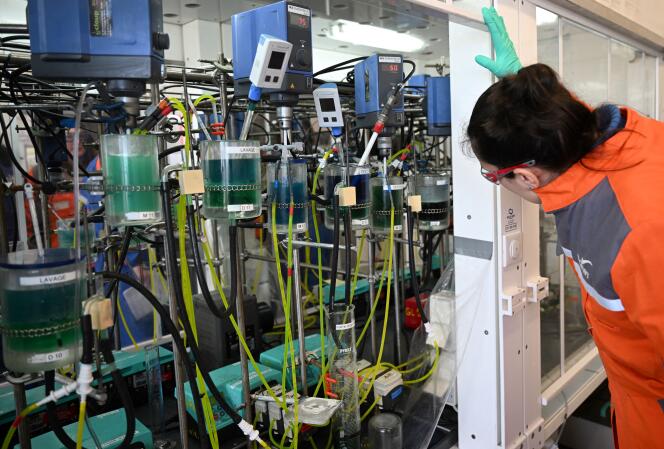First, isolate the “modules”, the energy part of the electric battery which contains the metals. Then, crush and sort them to collect those containing rare metals such as nickel, lithium and cobalt. By so-called “hydro-metallurgical” processes using solvents and acids, this powder called “black mass”, the new black gold of the energy transition, is finally dissolved to recover the salts of these strategic materials in order to reuse them in new batteries. .
This, summarized, is part of France’s electric future according to the companies Eramet and Suez, which inaugurated, on Tuesday, November 14, a pilot plant intended to recycle lithium-ion batteries from electric vehicles.
Located within the Eramet research and innovation center, in Trappes (Yvelines), this site, modest in size (800 square meters) but strategic for the automobile industry, is the 1/1000 replicae of the future recycling complex which must be built in Dunkirk (North) for commissioning in 2027, subject to a final investment decision, which must be made in 2024 by Eramet.
“Infinitely over 90%” recycling
The industrial objective for the French mining group and the multinational specializing in water and waste management is twofold: to valorize the strategic metals present in batteries, by promising recycling “over 90% infinitely”and secure part of the supplies of “rare earths” of which France has very little compared to China, which holds almost half of their global production.
This project is “at the heart of the energy transition” underway in the country to achieve carbon neutrality by 2050, underlined Tuesday Agnès Pannier-Runacher, the Minister of Energy Transition, who came to inaugurate the pilot site. It is just as symbolic in terms of industrial sovereignty. “It is important not to move from one addiction to another [des énergies fossiles aux terres rares] while critical metals are now at the heart of all strategic value chains of the zero carbon economy”added the minister.
The future Dunkirk complex plans two factories. A so-called “upstream”, which will be managed by Suez and will ensure the dismantling, crushing and separation of battery components to produce black mass. Processing capacity objective: 50,000 tonnes of modules per year, the equivalent of 200,000 NMC (nickel-manganese-cobalt) type batteries, the most widespread in Europe. And an “downstream”led by Eramet, which will be responsible for extracting and refining rare metals in blackmass to produce “5,000 tonnes of nickel, 1,000 tonnes of cobalt and 5,000 tonnes of lithium per year”according to Julien Masson, director of strategy at Eramet.
You have 40% of this article left to read. The rest is reserved for subscribers.
